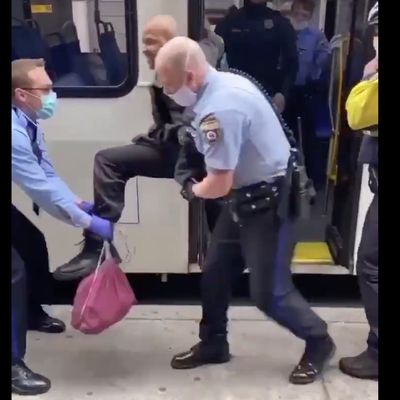
The below video, shared on social media on Friday, shows multiple police officers in Philadelphia forcibly removing a man from a public bus for enforcing what was — apparently as a result of this incident — an exceptionally short-lived mandate requiring riders to wear face masks:
Under a new coronavirus-prompted policy, which went into effect Thursday under the name “Lifeline Service Schedule,” the Southeastern Pennsylvania Transportation Authority announced service cuts and said it was “now asking all riders to wear masks or other facial coverings, consistent with new CDC guidelines, to protect both riders and operators.” This was apparently not a request, however, as riders soon began reporting instances of people not being allowed on public transit vehicles if they weren’t wearing a mask:
In a statement to WHYY on Friday, a SEPTA spokesperson confirmed that masks were indeed a requirement for customers, emphasizing that the agency was looking to avoid arresting anyone for violating the policy, and that “the covering can be as simple as a shirt, bandana or anything else someone can grab at home before they head out.” WHYY also reports that transit police were informed of the mandate on Wednesday in an emailed directive from the SEPTA police chief. It’s not clear if or how well this mandate was actually communicated to riders, however, or how widely it was enforced — or if it was even legal.
After the video of the rider’s violent ejection went viral, SEPTA officials said the policy was being reviewed and police said they were investigating the incident. SEPTA later rescinded the policy.
According to CBSN Philly, SEPTA operators briefly had the right to refuse service to customers who weren’t wearing masks, which is reportedly what happened on Friday:
During Friday’s press conference, Philadelphia Managing Director Brian Abernathy says the bus driver initially asked the man to get off the bus since he wasn’t wearing a mask. The bus driver then pulled over and called police after the man refused to leave.
“Police were not responding to the social distancing complaint, police were responding to the fact the person was asked to leave the bus and refused,” Abernathy said.
But as seen in the video, the passenger was not arrested or fined afterward, and as CBSN notes, “some sort of official boarded the bus telling everyone without a mask, that they had to exit or that police would physically remove them. That one man didn’t get off and that’s why he was physically removed.”
The Philly Transit Riders Union, which called attention to the incident on Friday, released a statement detailing SEPTA’s failures and highlighting a far easier way to have dealt with the situation. “If riding public transit requires a face mask,” the organization said, “then SEPTA must provide masks to transit workers and riders”:
On Thursday, SEPTA “urged” riders to wear face masks, despite masks still being listed as a prohibited item on other parts of SEPTA’s website. At some point later in the day, masks apparently became a “condition for riding transit,” although a rider would only know this if they asked SEPTA directly on Twitter. Bus operators received a conflicting message that transit riders did not have to wear a mask.
Under normal conditions, conflicting messages from SEPTA management might only cost riders their time– missed birthdays, graduations, job interviews, doctor’s appointments. During the COVID-19 pandemic, an interaction with an armed police officer could cost a Philly transit rider their life.
On Tuesday, the agency confirmed that three Philadelphia transit workers had been killed by COVID-19, and as of Friday, at least 100 SEPTA employees had tested positive for the coronavirus. While it hasn’t been hit anywhere near as hard as the MTA has in New York City, SEPTA has still been rocked by the virus and seen ridership plummet. The agency has also been accused of putting “profit over people” by Transport Workers Union Local 234 president Willie Brown, who has said SEPTA was too slow to enact policies to protect its workforce.
The now widely seen incident in Philadelphia obviously comes at a particularly tense time throughout the country, as authorities and the public navigate brand new legal and social norms amid efforts to confront and contain the coronavirus. The risk of contagion is one problem; the risk of violence and intolerance caused by fear or misunderstanding of contagion is another. And while wearing face masks in public may be what the CDC finally came around to recommending, that doesn’t mean everyone is going to find and wear one, or is going to feel safer if they do:
“This (wearing a homemade mask) seems like a reasonable response unless you just sort of take American society out of it. When you can’t do that, you’re basically telling people to look dangerous given racial stereotypes that are out there,” Trevon Logan, an economics professor at Ohio State University, recently explained to CNN. “This is in the larger context of black men fitting the description of a suspect who has a hood on, who has a face covering on. It looks like almost every criminal sketch of any garden-variety black suspect.”
Thanks to the coronavirus pandemic, public mask-wearing is undoubtedly going to become far more widespread in America, even if or when the threat of COVID-19 has passed. In the meantime, state, local, and federal authorities still seem to be designing their public-health policies on the fly, leaving lots of room for screwups, confusion, and overreach or abuse. Friday’s incident in Philadelphia is unlikely to be the last of its kind.






























